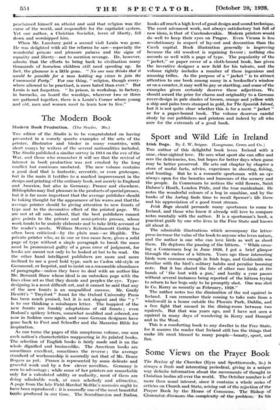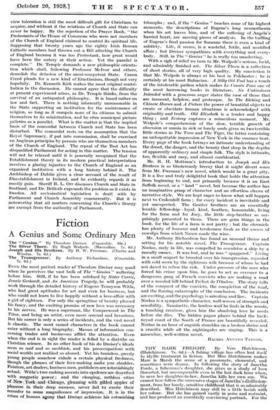Some Views on the Prayer Book
The Review of the Churches (Eyre and Spottiswoode, 3s.) is always a fresh and interesting periodical, giving in a unique way definite information about the movements of thought in Christian bodies all over the world. The October number is of more than usual interest, since it contains a whole series of articles on Church and State, arising out of the rejection of the Prayer Book by the House of Commons. The Bishop of Gloucester, discusses. the- complexity of the problem. In his view toleration is still the most di(1icult-gift for Christians to acquire, and without it the relations of Church and State can never be happy. By the rejection of the Prayer Book, "the Protestants of the House of Commons who were not members . of the Church of England claimed to control its spiritual life. Supposing that twenty years ago the eighty Irish Roman Catholic members had thrown out a Bill affecting the Church of England because it was too Protestant, how great would have been the outcry at their action. Yet the parallel is complete.” Dr. Temple demands a new philosophic orienta- tion which shall, following Professor Mclvor and others, demolish the delusion of the omni-competent State. Canon Creed pleads for a new kind of Erastianism, though not very hopefully. Dr. Kenneth Kirk makes the most original contri- bution to the discussion. He cannot agree that the difficulty at present experienced arises, as Dr. Temple thinks, from the survival of an antiquated philosophy. It is based rather on law and fact. There is nothing inherently unreasonable in the State supporting an institution for the maintenance of religion, so long as it compels none of its citizens to submit themselves to its ministration, and he, cites municipal picture galleries as a parallel. What is the matter is that the implied basis of the concordat between Church and State has been disturbed. The concordat rests on the assumption that the Royal Supremacy, if put into commission, shall be exercised on Anglican principles by persons who are themselves members of the Church of England. The repeal of the Test Act has disqualified Parliament for acting in this matter. The tension will not be relaxed until it is generally recognized that the Establishment theory in its modern practical interpretation involves a glaring injustice to the Church of England as an organized institution with a long history behind it. The Archbishop of Dublin gives a clear account of the result of Disestablishment in Ireland, and he evidently regards it as mostly gain. Sheriff R. L. Orr discusses Church and State in Scotland, and Dr. Brilioth expounds the problem as it exists in Sweden. All ecclesiastical legislation is dealt with by Parliament and Church Assembly concurrently. But it is noteworthy that all matters concerning the Church's liturgy are exempt from the authority of Parliament.































































 Previous page
Previous page